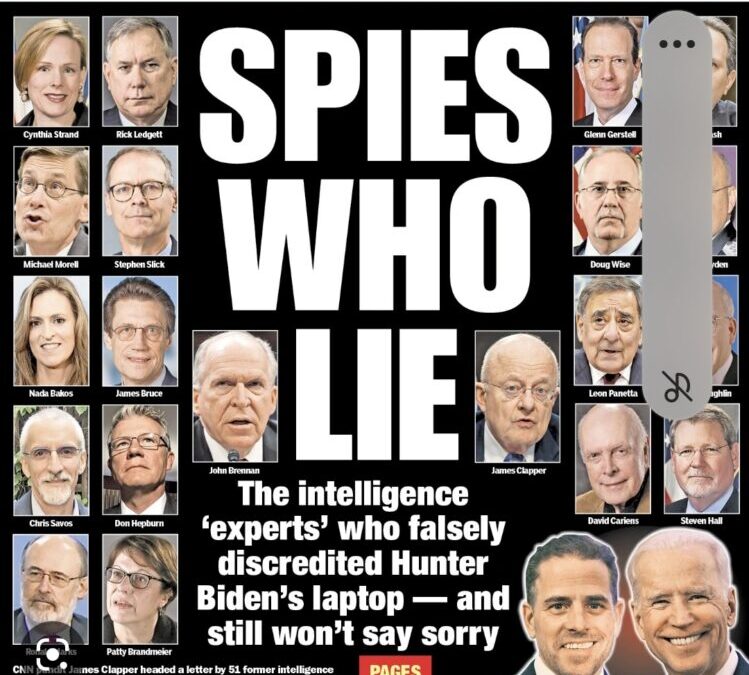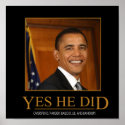Reprint
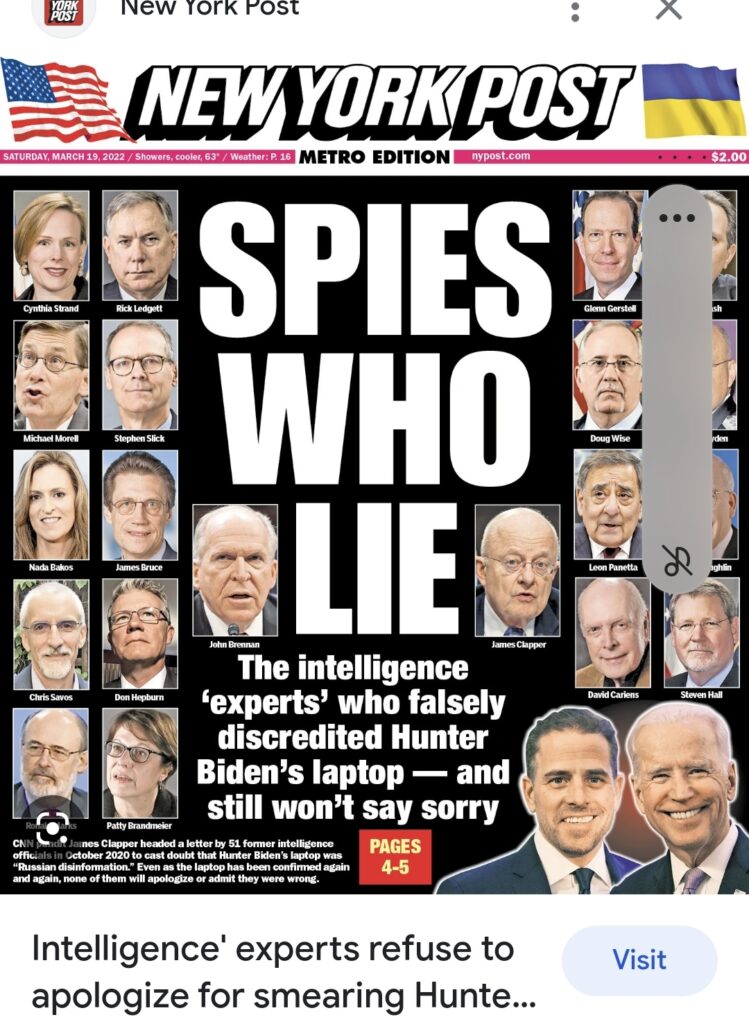
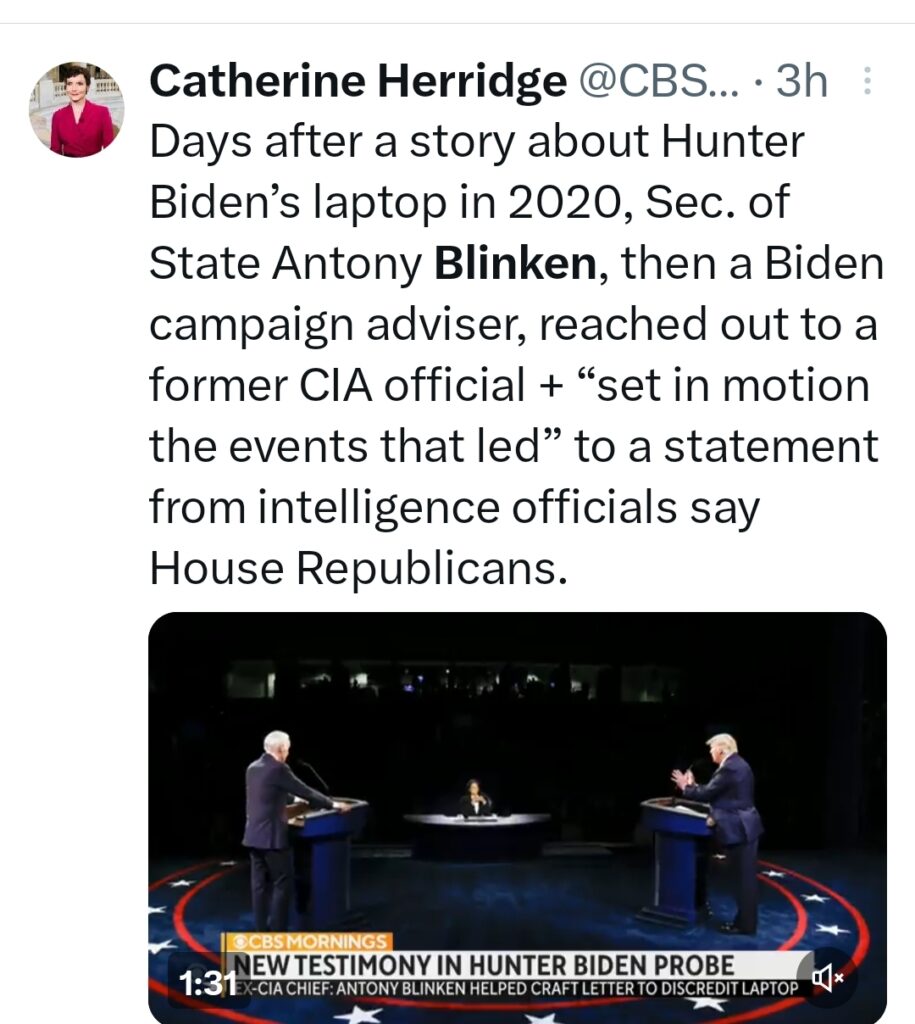
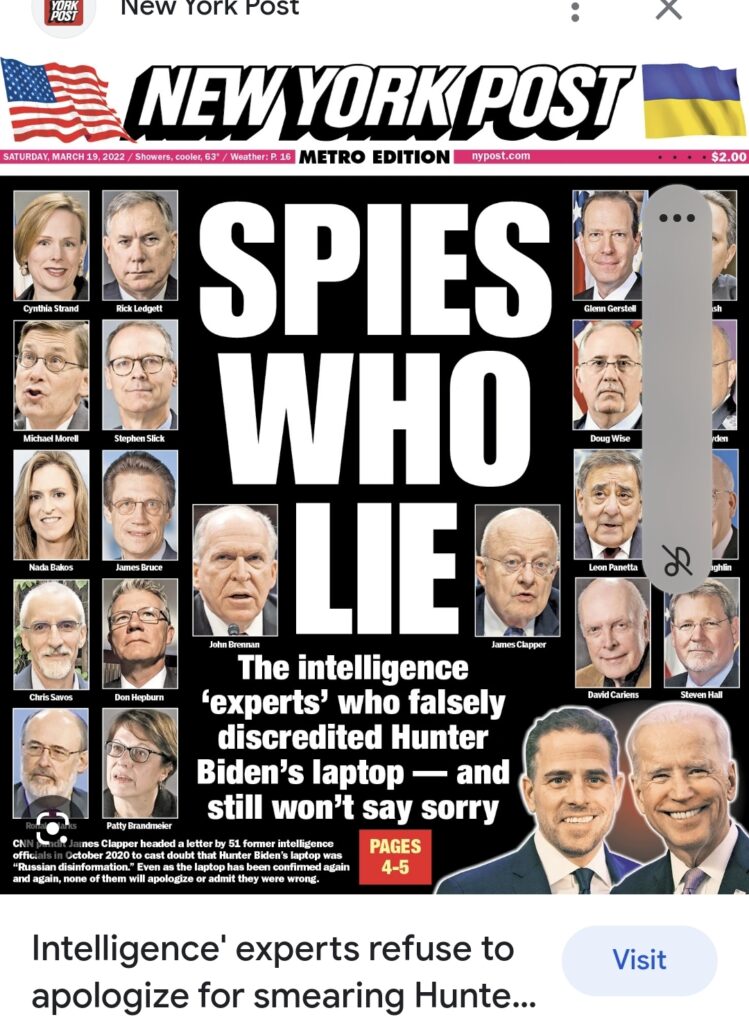
Spies who lie: 51 ‘intelligence’ experts refuse to apologize for discrediting true Hunter Biden story
March 18, 2022 | 8:35pm
They are the supposed nonpartisan group of top spies looking out for the best interest of the nation.
MORE ON:HUNTER BIDEN
But the 51 former “intelligence” officials who cast doubt on The Post’s Hunter Biden laptop stories in a public letter really were just desperate to get Joe Biden elected president. And more than a year later, even after their Deep State ⁷⁷⁷⅞ has been shown again and again to be a lie, they refuse to own up to how they undermined an election.
The officials, including CNN pundit and professional fabricator James Clapper — a man who was nearly charged for perjury for lying to Congress — signed a letter saying that the laptop “has the classic earmarks of a Russian information operation.”
Nutri system- Find the best weight loss plan for you in seconds

What proof did they have? By their own admission, none. “We do not know if the emails . . . are genuine or not,” the letter said. They’re just “suspicious.” Why? Because they hurt Biden’s campaign, that’s evidence enough.
Keep in mind this was written Oct. 19, 2020, five days after The Post published its first story. Neither Joe Biden nor Hunter Biden had denied the story, they simply deflected questions. Didn’t these security experts think that if this was disinformation, the Biden campaign would have yelled to the heavens that the story was false?
Meanwhile, though the letter was advertised as being signed by people who worked “for presidents of both political parties,” a majority of the officials were Democrats.
Politico picked up the letter and ran the false headline “Hunter Biden story is Russian disinfo, dozens of former intel officials say.” That headline is still online today, even though the letter clearly says they don’t know if it’s Russian disinformation.
That headline was tweeted out by legions of Democrats, including current White House spokeswoman Jen Psaki, as proof that it was all a con. That tweet also is still up despite being proven false.
Thus pure speculation by a group of biased officials became gospel among the media. This was “fake news,” and could be safely ignored.
Keep in mind that Twitter already had banned The New York Post a few days before. The rationale was that this was “hacked materials,” even though it wasn’t — and Twitter had no evidence to think it was. A Facebook official, meanwhile, said it wasn’t going to allow the sharing of The Post’s story until it was “fact checked” by a third party — a check that never happened.
Thus, Big Tech, former government officials, and the media conspired together to bury a story.
No, not just bury — create a false narrative that flipped the script to make Joe Biden the victim of a conspiracy.
In short, they peddled online disinformation to sway an election.
No one actually proved The Post’s reporting was wrong. Media outlets showed up at the doorstep of the computer repairman who had gotten the laptop, and he confirmed it. People who exchanged e-mails with Hunter Biden attested to their accuracy in the days and weeks that followed.
Only after the election was safely over did Hunter tacitly admit the laptop was his. Last year, a Politico reporter confirmed that the laptop’s materials were real. And now, the coup de grace: The Times said it’s “authenticated” material from the laptop.
There have been no consequences. Twitter and Facebook still censor information based on political bias, and Congress takes no action. Many of the letter signers continue to be used as “experts” by the media. Clapper, for instance, spent years on CNN calling Donald Trump a “Russian asset,” a lie invented and fed by political operatives of Hillary Clinton. He’s still there. Guess accuracy is not a condition of employment.
Do the officials who tried to flip the 2020 election feel any regret for their actions? The Post reached out to those who signed the letter. Most would not answer the question. A few doubled-down, including Clapper. No remorse. No shame. And no apologies:
Mike Hayden, former CIA director, now analyst for CNN: Didn’t respond.
Jim Clapper, former director of national intelligence, now CNN pundit: “Yes, I stand by the statement made AT THE TIME, and would call attention to its 5th paragraph. I think sounding such a cautionary note AT THE TIME was appropriate.”
Leon Panetta, former CIA director and defense secretary, now runs a public policy institute at California State University: Declined comment.
John Brennan, former CIA director, now analyst for NBC and MSNBC: Didn’t respond.
Thomas Fingar, former National Intelligence Council chair, now teaches at Stanford University: Didn’t respond.
Rick Ledgett, former National Security Agency deputy director, now a director at M&T Bank: Didn’t respond.
John McLaughlin, former CIA acting director, now teaches at Johns Hopkins University: Didn’t respond.
Michael Morell, former CIA acting director, now at George Mason University: Didn’t respond.
Mike Vickers, former defense undersecretary for intelligence, now on board of BAE Systems: Didn’t respond.
Doug Wise, former Defense Intelligence Agency deputy director, teaches at University of New Mexico: Didn’t respond.
Nick Rasmussen, former National Counterterrorism Center director, now executive director, Global Internet Forum to Counter Terrorism: Didn’t respond.
Russ Travers, former National Counterterrorism Center acting director: “The letter explicitly stated that we didn’t know if the emails were genuine, but that we were concerned about Russian disinformation efforts. I spent 25 years as a Soviet/Russian analyst. Given the context of what the Russians were doing at the time (and continue to do — Ukraine being just the latest example), I considered the cautionary warning to be prudent.”
Andy Liepman, former National Counterterrorism Center deputy director: “As far as I know I do [stand by the statement] but I’m kind of busy right now.”
John Moseman, former CIA chief of staff: Didn’t respond.
Larry Pfeiffer, former CIA chief of staff, now senior advisor to The Chertoff Group:
Didn’t respond.
Jeremy Bash, former CIA chief of staff, now analyst for NBC and MSNBC: Didn’t respond.
Rodney Snyder, former CIA chief of staff: Didn’t respond.
Glenn Gerstell, former National Security Agency general counsel: Didn’t respond.
David Priess, former CIA analyst and manager: “Thank you for reaching out. I have no further comment at this time.”
Pam Purcilly, former CIA deputy director of analysis: Didn’t respond.
Marc Polymeropoulos, former CIA senior operations officer: Didn’t respond.
Chris Savos, former CIA senior operations officer: Didn’t respond.
John Tullius, former CIA senior intelligence officer: Didn’t respond.
David A. Vanell, former CIA senior operations officer: Didn’t respond.
Kristin Wood, former CIA senior intelligence officer, now non-resident fellow, Harvard: Didn’t respond.
David Buckley, former CIA inspector general: Didn’t respond.
Nada Bakos, former CIA analyst and targeting officer, now senior fellow, Foreign Policy Research Institute: Didn’t respond.
SEE ALSO
How Dem officials, the media and Big Tech worked in concert to bury the Hunter Biden story
Patty Brandmaier, former CIA senior intelligence officer: Didn’t respond.
James B. Bruce, former CIA senior intelligence office: Didn’t respond.
David Cariens, former CIA intelligence analyst: Didn’t respond.
Janice Cariens, former CIA operational support officer: Didn’t respond.
Paul Kolbe, former CIA senior operations officer: Didn’t respond.
Peter Corsell, former CIA analyst: Didn’t respond.
Brett Davis, former CIA senior intelligence officer: Didn’t respond.
Roger Zane George, former national intelligence officer: Didn’t respond.
Steven L. Hall, former CIA senior intelligence officer: Didn’t respond.
Kent Harrington, former national intelligence officer: Didn’t respond.
Don Hepburn, former national security executive, now president of Boanerges Solutions LLC: “My position has not changed any. I believe the Russians made a huge effort to alter the course of the election . . . The Russians are masters of blending truth and fiction and making something feel incredibly real when it’s not. Nothing I have seen really changes my opinion. I can’t tell you what part is real and what part is fake, but the thesis still stands for me, that it was a media influence hit job.”
Timothy D. Kilbourn, former dean of CIA’s Kent School of Intelligence Analysis: Didn’t respond.
Ron Marks, former CIA officer: Didn’t respond.
Jonna Hiestand Mendez, former CIA technical operations officer, now on board of the International Spy Museum: “I don’t have any comment. I would need a little more information.”
Emile Nakhleh, former director of CIA’s Political Islam Strategic Analysis Program, now at University of New Mexico: “I have not seen any information since then that would alter the decision behind signing the letter. That’s all I can go into. The whole issue was highly politicized and I don’t want to deal with that. I still stand by that letter.”
Gerald A. O’Shea, former CIA senior operations officer: Didn’t respond.
Nick Shapiro, former CIA deputy chief of staff and senior adviser to the director: Didn’t respond.
John Sipher, former CIA senior operations officer: Declined to comment.
Stephen Slick, former National Security Council senior director for intelligence programs:
Didn’t respond.
Cynthia Strand, former CIA deputy assistant director for global issues: Didn’t respond.
Greg Tarbell, former CIA deputy executive director: Didn’t respond.
ADVERTISEMENT
David Terry, former National Intelligence Collection Board chairman: Couldn’t be reached.
Greg Treverton, former National Intelligence Council chair, now senior adviser at the Center for Strategic and International Studies: “I’ll pass. I haven’t followed the case recently.”
Winston Wiley, former CIA director of analysis: Couldn’t be reached.
© 2023 NYP Holdings, Inc. All Rights Reserved
Terms of Use | Privacy

